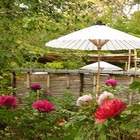Joana had never left the rural area where she was born and raised, but when she was 49, her daughter Luisa decided to attend nursing school in São Paulo and she went to live with her there until she had settled down.
She rented a small house in the suburbs and commuted to work on a crowded bus. For her daughter, she tried many things she was not used to. City life, which was completely different from the countryside, was a big adventure for Joana.
Six months later, Louisa moved in with the two seniors, and Joanna, feeling relieved that she had fulfilled her role, returned to the countryside and resumed her life of farm work and housework.
When Louisa was nearing the end of her nursing school graduation, she returned to her parents' house to meet someone she wanted to introduce to them. The man she came with was Takeshita Nobu, the older brother of Kaori, with whom she lived.
Nobu had been living in Japan for 10 years. He worked at an automobile factory in Oizumi-machi, Japan, and created a dekasegi soccer team, leading a fulfilling life in Japan. When he returned to Brazil for the first time in two years to attend a relative's wedding, the two met. It was love at first sight. "May I go out with you, Luisa? Thank you!" Nobu bowed his head.
Joanna and her husband were surprised by this sudden event. They were happy that their daughter had found a lover, but the lover lived in faraway Japan. They thought that their precious daughter might one day go far away...
However, seeing the happy smiles on Louisa and Nobu's faces, the family eventually gladly accepted them.
Nobu returned to Japan soon after, and the two kept in touch via email and cell phones.
The following year, the couple were married in the rural village where Louisa was born and raised.
A year later, Luisa called me with the good news: she was now two months pregnant and, unlike many Brazilians, would be giving birth in Japan.
After discussing it together, the family decided to send Joana to Japan. Just as they had been able to provide excellent support for Luisa's life in São Paulo, a big city she had never been to before, they all believed that they would be able to provide adequate support for Luisa before and after the birth, even in Oizumi-machi, where they didn't speak the language. Joana also decided to take on this role. And so Joana's second adventure began.
When Joana first saw Oizumi-machi, there were many shops and restaurants that caught her eye. Strangely enough, it wasn't all new to her. There were flashy yellow and green stores here and there, Brazilian flags were flying everywhere, and she saw several signs in Portuguese. "Is this Brazil? Japan?" she wondered as she walked through the town, her heart pounding with excitement.
Joana, who started living in her daughter and son-in-law's apartment, lived in the balcony space separated from the living room. When Joana saw that there was always laundry hanging out on the balcony, she thought it was strange. This is because in Brazil, laundry is hung out in the garden at the back, and the balcony is a place to put flowers and flower pots. She also found it strange that there was no "tanki 1 " for washing clothes. However, she thought that taking off shoes and changing into slippers at the entrance was a very good custom.
Luisa gave birth to a healthy baby boy and named him Cristiano Yoshio. Nobu said he didn't want a Japanese name, but Luisa wanted to give him the Japanese name of her father-in-law.
At first, Joana helped out with a lot of things, but my daughter got used to taking care of a baby faster than I expected. After a while, at my daughter's urging, she started going out on her own. She went to greengrocers, bakeries, and supermarkets and talked to Japanese housewives, and also attended cooking classes. It was a lot of fun.
One day, Sumire Mori, who was attending the same cooking class, invited Joanna to come over to her house, saying, "It's been a while since I last made sweets."
When Joana visited a Japanese home for the first time, she tried "Castella" there. It was a moment that changed her life!
Joan was enchanted by the soft and moist texture of castella cake and asked Mori to teach her how to make it. She tried it at home many times and served it to her neighbors. Then, she started receiving orders.
Joana's Castella cakes were so popular that the owner of a Brazilian food store offered her space in the shop. Joana was grateful, but she declined.
It had been two and a half months since I arrived in Japan, and I was thinking about going back to Brazil soon. I wanted to see my husband, my son and his wife, my elderly father and my grandchildren, and I wanted to tell them about the good things about Japan.
Her daughter was very disappointed and suggested that she take a vacation and travel with her husband. But Joanna said, "You have been so kind to me, this is enough. Louisa, thank you for being my daughter. Thank you for choosing such a kind and caring husband. And thank you for giving birth to a healthy baby. I am grateful to God. Thanks to you, I have been able to see so many wonderful things and I am so happy. Japan is the best! I love the Japanese people too!"
Joana was moved to tears. Then, an idea struck her! "That's it! Let's open a store in Brazil. How about "CASTELA DA JOANA 2 "?"
Knowing Joana's drive, we all knew she would make it happen. We're all looking forward to seeing her.
Notes:
1. Laundry sink
2. "Joanna's Castella"
© 2019 Laura Honda-Hasegawa




